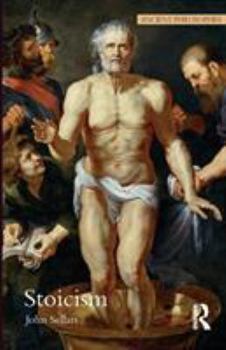Book Overview
An introduction to Stoic philosophy. Aimed at readers new to Stoicism and to ancient philosophy, this book outlines the central philosophical ideas of Stoicism and introduces the reader to the... This description may be from another edition of this product.
Format:Paperback
Language:English
ISBN:1844650537
ISBN13:9781844650538
Release Date:April 2006
Publisher:Routledge
Length:224 Pages
Weight:0.83 lbs.
Dimensions:0.5" x 5.5" x 8.5"
Customer Reviews
1 rating
Excellent introduction.
Published by Thriftbooks.com User , 16 years ago
Who were the Stoics? How did they understand philosophy? How did their ideas of "ethics," "physics" (including what we call "metaphysics" as well as science), and "logic" (also much broader than what Mr. Spock engages in) join together into an organic whole? What role did the sage play in the Stoic system -- if such a creature were even possible. (Stoic agnosticism on this point was very similiar to that of the early Confucians about a "sheng ren," BTW.) Sellars begins by giving an overall answer to these questions. Then he describes the three Stoic categories -- physics, logic, and ethics -- in the following chapters. He finishes the book with a chapter on the "Stoic legacy" -- the influence they have had since their gradual disappearance in the 4th and 5th Centuries. (One surprise: John Calvin was sympathetic to the Stoics in an early writing -- I've read his commentary on Acts 17, in which Paul discusses the Christian faith with Epicurean and Stoic philosophers in Athens, and he didn't seem so open-minded there -- perhaps because he was jousting at "Papist" shadows. But Sellars spreads his comments out through the centuries -- this section is very succinct, but interesting.) I wanted a good general introduction to Stoicism, before reading (as I plan to) more of the primary and secondary material. This book turned out to be great for that purpose. It's simple, fairly straightforward, though Sellars also interacts in a light way with the scholarship, and does an excellent job of "mapping out" key figures and questions. Sellars is objective, seldom intruding his own views on the discussion, but (in general) describing what is understood about the Stoics, and clearly marking out where opinions differ. All in all, an excellent introduction to an interesting school of thinkers. One of several things that piqued my curiosity, was the dissonance between the tone of Cleanthes' Hymn to Zeus, and the role "God" plays in abstract Stoic philosophy. Sellars doesn't pick up on this, but the contradictions in Stoic philosophy seem as interesting to me as the continuity.





